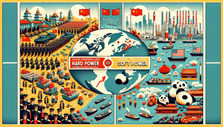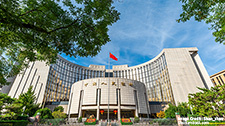The Balance of Power: Taiwan’s TSMC-led Economic Might and Cross-Strait Relations

Brian Iselin
Following my previous article on the role stock exchanges play in maintaining a delicate peace between China and Taiwan, I was asked specifically about the ramifications of Taiwan’s burgeoning stock market. It’s an era where the Taiwanese stock market is not just thriving but soaring, primarily buoyed by the stellar performance of the Taiwan Semiconductor Manufacturing Company (TSMC). This remarkable trend isn’t just a testament to Taiwan’s economic resilience; it’s a phenomenon with deep-seated geostrategic implications, particularly through the lens of Cross-Strait relations. Let’s take an all-too-brief walk through the military, economic, and political dimensions to unpack whether Taiwan’s economic surge serves as a beacon of peace or a harbinger of tension.
Military Perspective: The Economic Shield
Taiwan’s burgeoning economy, symbolised by its robust stock market, stands as a formidable bulwark against potential military aggressions. Central to this defense is Taiwan’s unparalleled dominance in the semiconductor industry, led by TSMC. This industry’s critical role in the global tech ecosystem renders Taiwan an indispensable node in the world’s technological advancements. An escalation of military tensions in the Taiwan Strait doesn’t merely signal regional unrest; it poses a palpable threat to global economic stability. The prospect of such disruption elevates the stakes for potential aggressors, including China, compelling a re-evaluation of military strategies in favour of economic considerations. The implicit message here is clear: when Taiwan’s economy is burgeoning and role in global supply chains is vital, the economic repercussions of conflict far outweigh potential gains, embedding an additional layer of security that transcends traditional military capabilities.
Economic Perspective: Weaving a Web of Interdependence
The vibrancy of Taiwan’s stock market, especially its tech sector’s exponential growth, has intricately intertwined the economies across the Taiwan Strait. China, a global economic powerhouse, finds itself deeply enmeshed in this tech supply chain, reliant on Taiwanese semiconductors for its technological ambitions. This interdependence acts as a double-edged sword, fostering a mutual desire for stability while highlighting the catastrophic potential of economic decoupling. The symbiotic relationship between Taiwan’s economic fortunes and regional stability suggests a path towards a pragmatic and cooperative economic framework, one that mitigates the likelihood of aggressive confrontations and nurtures a conducive environment for peaceful coexistence.
Political Perspective: The Global Stage and Taiwan’s Ascendancy
Taiwan’s stock market success story transcends economic metrics, catapulting the island nation onto the global stage with renewed vigour and international support. This ascendancy is not merely symbolic; it reinforces Taiwan’s geopolitical standing, offering a buffer against coercive manoeuvres by China. However, this burgeoning international support is not without its complexities. Taiwan’s increased economic assertiveness, while empowering, invites scrutiny and, potentially, provocation. The delicate dance on the international stage requires a nuanced approach, balancing economic confidence with diplomatic finesse to navigate the filigreed web of global politics.
On Balance: Navigating the Future
The multifaceted implications of Taiwan’s thriving stock market, particularly through the prism of TSMC’s success, highlight a complex tableau of cross-strait dynamics. Economically and militarily, Taiwan’s ascendancy acts as a deterrent to conflict, advocating for a stable and cooperative regional order. Politically, however, the waters are murkier. The elevation of Taiwan’s global stature, while bolstering its defence against aggression, also necessitates a careful recalibration of diplomatic strategies to prevent exacerbating tensions.
The current epoch of Taiwanese economic prosperity, as mirrored in its stock market’s performance, predominantly signals an opportunity — a chance to cement peace and stability in a region fraught with historical complexities. This potential, however, is contingent upon the strategic foresight of both sides of the Strait. By embracing economic interdependence and fostering an environment of mutual respect and dialogue, there lies a pathway towards a harmonious future. Conversely, allowing economic triumphs to fuel arrogance or escalate political tensions could destabilise the very foundation of this prosperity.
Taiwan’s economic vitality, showcased by its stock market’s strength, offers a beacon of hope for peace but also a reminder of the intricate balance required to maintain it. It’s imperative to navigate these waters with cautious optimism, recognising the transformative power of economic prosperity as a cornerstone for a stable and peaceful Cross-Strait relationship.
The earlier piece by the author can be read here.
Related Publications
-
The US and EU, and the Emerging Supply Chain Network: Politics, Prospects, and Allies
The Global Supply Chains have evolved from simply logistical achievements to being the bedrock of the global economy. Driven by technological advances and geopolitical shifts, this transformation underscores the critical […]
-
Hegemony at a Crossroads: The Inverse Dynamics of China’s Global Strategy
Here is my bold statement. Hard power projection decimates soft power but only for authoritarian states. In the early 21st century, I was living in Beijing and at that time […]
-
ISDP Annual Report 2023
ISDP’s Annual Report for the year 2023. We look back on 2023, a year in which tensions and conflicts captured the strategic space in ISDP’s focus areas, making headlines around […]
-
The Economic Leash: China’s Financial Tethers and Global Power Plays
China’s emphasis on Gross Domestic Product (GDP) growth and its integration into global markets have allowed it to wield significant influence internationally. Nonetheless, this focus on rapid expansion has created […]
-
Two Tines, One Fork: China’s De-dollarisation and Bond Issuance Drive Economic Independence
I wrote earlier this week about China’s announcement of a huge sale of ultralong bonds (Iselin, 2024), and the implications of that sale in geostrategic terms. And already we have […]




